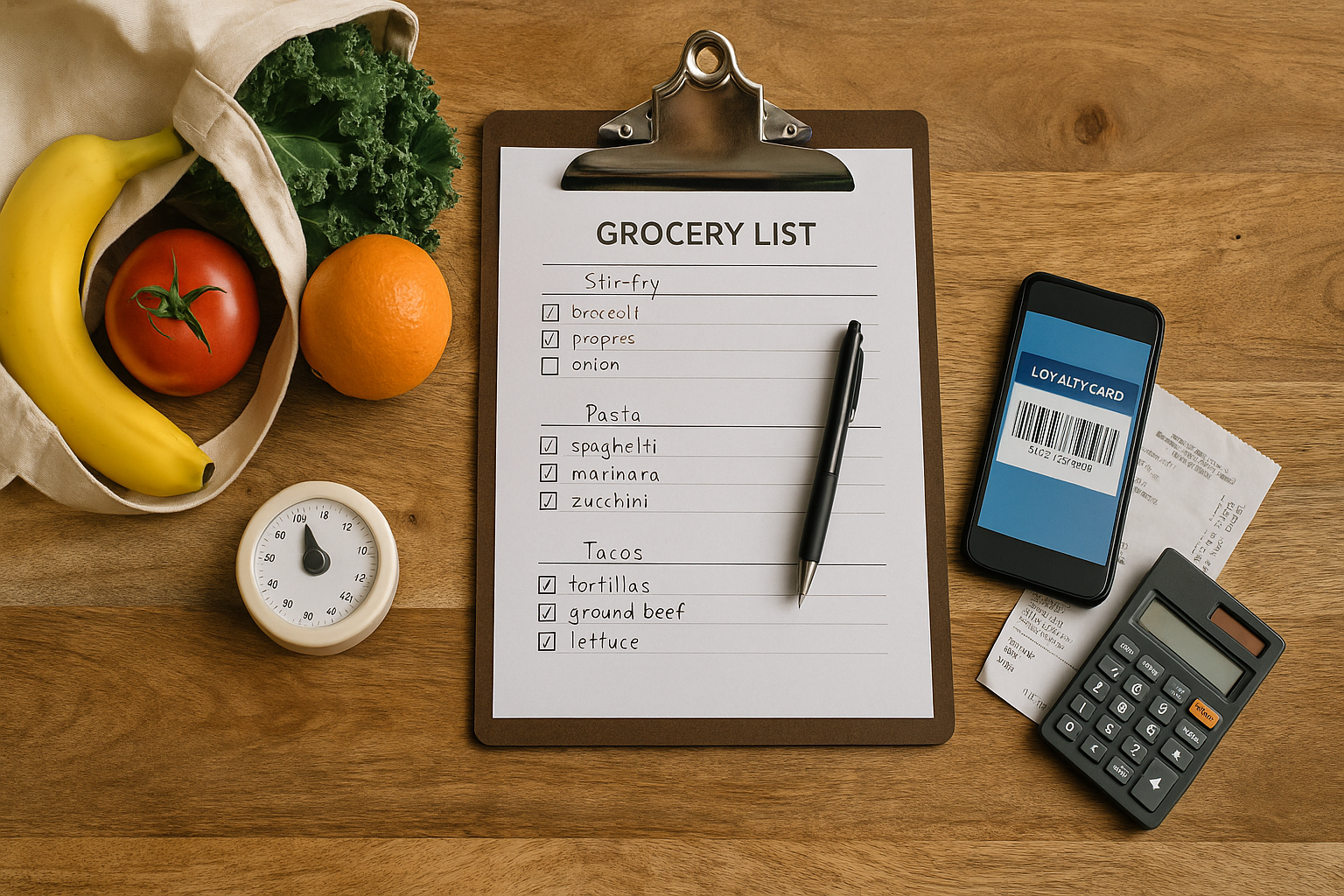Quick win: Use these grocery budget tips to save on groceries without coupons in about 20 minutes a week—no extreme couponing, no five-store marathons, just smart shopping that fits real life.
If grocery runs keep blowing up your budget, the fix isn’t hunting discounts for hours—it’s a simple system that reduces decisions, food waste, and impulse buys. Steal the playbook below and keep your cart—and costs—calm.
Your 20-Minute Weekly Setup
1) Plan 3 anchor meals (5 minutes)
Choose three easy, repeatable dinners you actually enjoy (e.g., sheet-pan chicken, pasta + veg, tacos). They supply leftovers for lunches and reduce midweek takeout. Write the ingredients; everything else you buy should piggyback on these meals.
2) Make a one-page list (5 minutes)
Divide it into Produce · Protein · Pantry · Dairy · Frozen · Household. A fixed layout speeds your trip and prevents forgotten items that trigger extra store runs.
3) Check the kitchen first (5 minutes)
Open the fridge/freezer/pantry and “shop your shelves.” Plan to use the most perishable items this week. Add one “use-it-up” meal (fried rice, frittata, soup) to convert scraps into dinner.
4) Set a cart cap (5 minutes)
Decide a target total before you go (e.g., $120/week). On the last aisle, put two low-joy items back if you’re over. This tiny rule saves more than most coupons.
Smart Shopping Moves (Fast, Not Fussy)
- Compare unit prices, not sticker prices. Check the price per ounce/lb on the shelf tag. The “big” package isn’t always cheaper.
- Store brands for staples. Flour, rice, canned tomatoes, oatmeal, cleaning basics—brand rarely matters. Taste-test one swap per week.
- Buy seasonal produce. In-season fruit/veg is cheaper and tastes better; frozen is a smart backup when fresh is pricey.
- Strategic convenience. Pre-cut veg or rotisserie chicken can be cheaper than takeout if they help you actually cook.
- Limit special ingredients. Choose recipes that reuse the same flavors (e.g., lemon, garlic, herbs) so nothing languishes.
- Use a smaller basket. It fills faster and curbs impulse buys—especially in the snack aisle.
- Skip single-serve packs. Buy full-size and portion at home; keep a stash of reusable containers or snack bags.
- Mind the end caps. Promotions aren’t always deals. If it wasn’t on your list, pause before adding.
- One store, once a week. Extra trips often equal extra spending. If you must visit a second store, give it a 10-minute timer.
- Join the free loyalty program. Digital prices apply automatically—no clipping required.
Beat Food Waste (Where the Hidden Savings Live)
- First-in, first-out fridge. Put new items behind old ones; keep a “use-me” bin for soon-to-expire foods.
- Prep the top 10 minutes. When you unload, wash berries, portion chicken, or chop tomorrow’s veg. Future-you will actually cook.
- Freeze more. Bread, cooked rice, soup, meat, herbs in olive oil—label and date. Freezers are anti-waste machines.
- Plan a “leftovers remix.” Tacos → quesadillas; roast veg → grain bowls; chicken → soup. Name the remix on your list.
Sample 7-Day, 3-Meal Plan (Family of 2–4)
- Dinners: Sheet-pan chicken + veg; Pasta with marinara + salad; Taco night; Fried-rice “use-it-up”; Veggie soup + grilled cheese; DIY baked potato bar; Leftovers.
- Lunches: Leftovers, tuna or bean salad, quesadillas.
- Breakfasts: Oatmeal, eggs + toast, fruit + yogurt.
Rotate the three anchors weekly so you keep variety without rebuilding from scratch.
Common Mistakes (and Easy Fixes)
- Coupon rabbit holes. Hours for pennies. Fix: Use loyalty pricing and unit-price checks instead—true save on groceries without coupons.
- Recipe overload. Five new dishes = five half-used ingredients. Fix: 3 anchors + remixes; repeat winners.
- Overbuying perishables. Aspirational produce becomes compost. Fix: Buy for 4–5 days of fresh; rely on frozen for the rest.
- Shopping hungry or hurried. Impulse city. Fix: Snack before you go and follow the one-page list.
FAQ
How can I track a grocery budget without extra work?
Keep a simple weekly cap and snap a photo of each receipt. Review totals during your Sunday reset; adjust next week’s plan by $10–$20 if needed.
Is bulk buying always cheaper?
No. Bulk wins if you’ll use it before it spoils and the unit price is lower. Otherwise, it ties up cash and increases waste.
What are the fastest wins if I’m short on time?
Store brands for staples, unit-price comparisons, and a fixed list based on 3 anchors. Those three habits deliver most savings with minimal effort.
Keywords: save on groceries without coupons, grocery budget tips, smart shopping

Leave a Reply